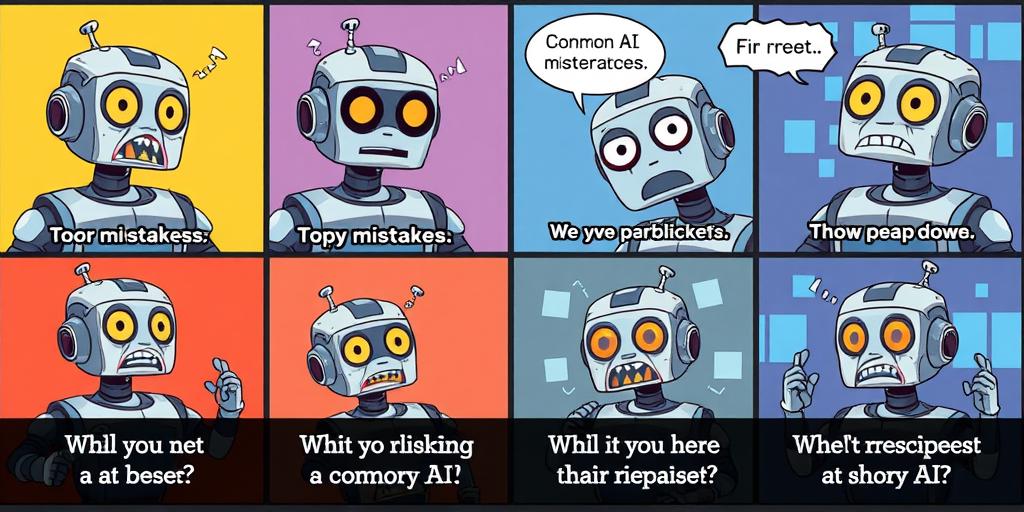Artificial intelligence is rapidly changing the world, but even the most advanced AI systems can make mistakes. These mistakes can be surprisingly funny, revealing the limitations of AI and its struggle to understand the complexities of human language and behavior.
Introduction: Laughter is the Best Medicine (and AI’s Worst Enemy)
AI fails are a reminder that these systems are still under development. While they have achieved remarkable progress in areas like image recognition and natural language processing, they are still far from perfect. These failures can be humorous, but they also highlight the need for careful development and ethical considerations as AI becomes increasingly integrated into our lives.
AI’s Misadventures in Image Recognition
One of the most common types of AI fails occurs in image recognition. These systems are trained on vast datasets of images, but they can still struggle to accurately identify objects and scenes.
Seeing Things That Aren’t There: Hallucinations and Misinterpretations
For example, an AI system might see a dog in a photo of a cat, or identify a car as a truck due to a slight difference in perspective. These “hallucinations” are often humorous, but they also underscore the limitations of AI’s ability to interpret visual information.
The Case of the Mistaken Identity: When AI Gets People Wrong
Another common issue is mistaking individuals. AI systems may struggle to recognize faces, particularly when dealing with diverse ethnicities or individuals with unique features. These mistakes can be embarrassing, especially when they involve public figures or sensitive situations.
Language Models Gone Wild: The Hilarious (and Sometimes Offensive) Misunderstandings
Language models are designed to understand and generate human language, but they can be surprisingly prone to misinterpretations. The nuances of language, such as sarcasm, irony, and slang, can be difficult for AI systems to grasp.
Lost in Translation: When AI Fails to Grasp the Nuances of Language
For example, a chatbot might misinterpret a sarcastic comment as a sincere statement, leading to an awkward or inappropriate response. A language model might also translate a sentence incorrectly, leading to a humorous misunderstanding of the intended meaning.
The Rise of the AI Comedian: Unintentional Humor in Machine-Generated Text
In some cases, these misunderstandings can be unintentionally funny. AI-generated text may contain nonsensical phrases or grammatical errors that create an amusing effect. This unintentional humor can be a testament to the complexity of human language and the challenges of replicating it with AI.
AI’s Social Faux Pas: When Machines Fail to Understand Human Interaction
AI systems are increasingly being used in social settings, such as customer service chatbots or virtual assistants. However, they can struggle to navigate the complexities of human interaction, leading to awkward and sometimes offensive situations.
The Awkward Chatbot: When AI Can’t Hold a Conversation
For example, a chatbot might respond inappropriately to a user’s question, or fail to understand the context of a conversation. These social blunders can be frustrating for users, and they highlight the need for AI systems to be more sensitive to human emotions and social cues.
The Unintentional Insult: When AI Gets Social Cues Wrong
AI systems may also struggle to recognize and respond to social cues. A chatbot might accidentally insult a user by making a culturally insensitive remark or failing to understand a joke. These mistakes can be harmful, as they can reinforce negative stereotypes and contribute to a sense of distrust in AI.
The Future of AI: Learning from Our Mistakes
Despite these failures, AI is continuing to evolve rapidly. By studying these mistakes, researchers and developers can improve the accuracy and reliability of AI systems.
The Importance of Human Oversight: Ensuring AI’s Ethical Development
Human oversight is crucial to ensure that AI is developed responsibly and ethically. This involves careful consideration of the potential risks and biases associated with AI, as well as the need for transparency and accountability in its development and deployment.
The Potential for AI to Learn from its Errors: A Path to More Accurate and Reliable Systems
AI systems can also learn from their mistakes through feedback mechanisms and machine learning algorithms. This allows AI to adapt to new information and improve its accuracy over time. As AI continues to evolve, we can expect to see fewer and fewer instances of these funny, but sometimes troubling, failures.
AI failures are a reminder that these systems are still under development. However, by embracing the humor of these mistakes and learning from them, we can ensure that AI is developed responsibly and ethically. The future of AI depends on our ability to create systems that are not only intelligent but also empathetic and sensitive to the nuances of human interaction.




